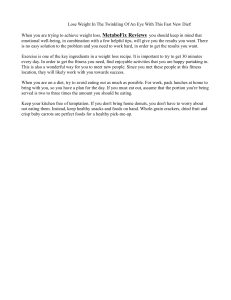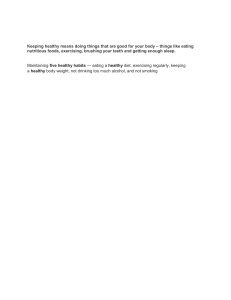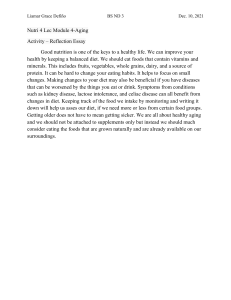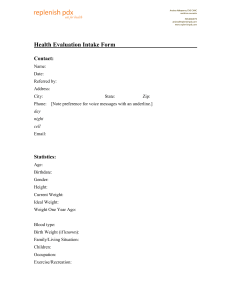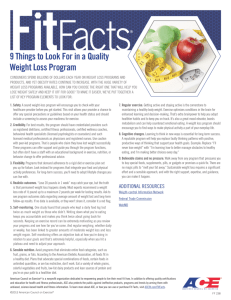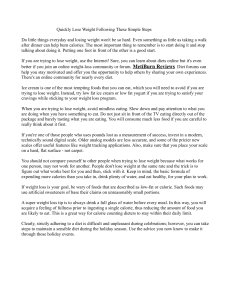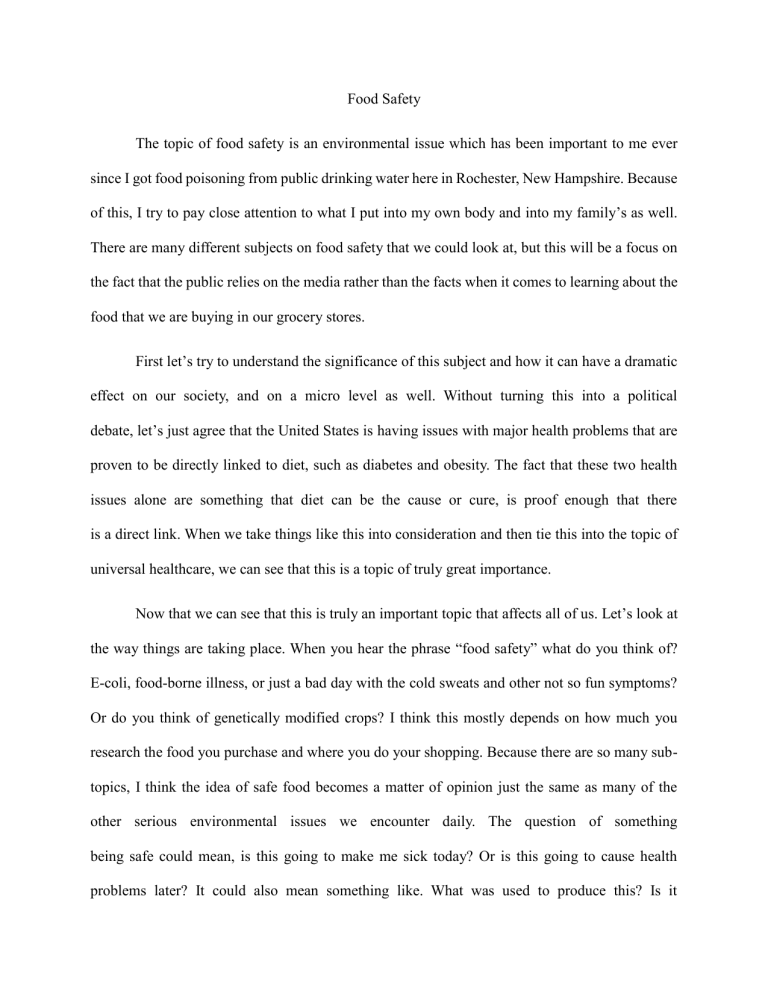
Food Safety The topic of food safety is an environmental issue which has been important to me ever since I got food poisoning from public drinking water here in Rochester, New Hampshire. Because of this, I try to pay close attention to what I put into my own body and into my family’s as well. There are many different subjects on food safety that we could look at, but this will be a focus on the fact that the public relies on the media rather than the facts when it comes to learning about the food that we are buying in our grocery stores. First let’s try to understand the significance of this subject and how it can have a dramatic effect on our society, and on a micro level as well. Without turning this into a political debate, let’s just agree that the United States is having issues with major health problems that are proven to be directly linked to diet, such as diabetes and obesity. The fact that these two health issues alone are something that diet can be the cause or cure, is proof enough that there is a direct link. When we take things like this into consideration and then tie this into the topic of universal healthcare, we can see that this is a topic of truly great importance. Now that we can see that this is truly an important topic that affects all of us. Let’s look at the way things are taking place. When you hear the phrase “food safety” what do you think of? E-coli, food-borne illness, or just a bad day with the cold sweats and other not so fun symptoms? Or do you think of genetically modified crops? I think this mostly depends on how much you research the food you purchase and where you do your shopping. Because there are so many subtopics, I think the idea of safe food becomes a matter of opinion just the same as many of the other serious environmental issues we encounter daily. The question of something being safe could mean, is this going to make me sick today? Or is this going to cause health problems later? It could also mean something like. What was used to produce this? Is it organic or is it factory produced? These are all questions that we may choose to ask or choose to avoid. Unfortunately, I think that too many people in the United States choose to avoid these questions because it is much easier to live our lives by thinking we are doing better by saving money and buying cheap food that makes our lives more efficient. The question then becomes. What do we gain by being able to purchase cheap food from big-box stores which allow us to make a meal in 20 minutes to feed a family of four? Is our life improving because we can do this? Or is it healthier to eat a frozen lunch that says “natural” or “lean” on it than to eat a peanut butter sandwich that has a bit more fat in it than the “lean” lunch? Again, this all comes down to our own opinions and lifestyle choices. Moving on, let’s look at the impact the media has had on this subject. CNN wrote an article stating, “Beef Products Inc. announced Thursday that the company has filed a $1.2 billion lawsuit against ABC News, three reporters (Diane Sawyer, Jim Avila, and David Kerley) and others, claiming damages because of their reports on BPI's lean finely textured beef product (LFTB) more colloquially known as "pink slime." Dan Webb, the company's lawyer, wrote in a public statement, "Through nearly 200 false, misleading and defamatory statements, repeated continuously during a month-long disinformation campaign, ABC and other individuals knowingly misled consumers into believing that LFTB was not beef and not safe for public consumption, which is completely false." Webb stated today in a phone call with reporters that, "The evidence is overwhelming that our product is 100% beef." BPI makes the product by grinding together beef scraps and connective tissue. The company then uses a mixture of ammonia and water (ammonium hydroxide) to prevent the risk for E. coli or salmonella contamination.” Now just because the company has stated that the FDA claims the product to be 100% beef and good for human consumption, would you consider this to be safe? Do we really know what long term effects this will have on us? Do we really want to consume something that has to be “sterilized” on such a dramatic level? Another article titled Genetically Modified Foods Have Numerous Benefits and No Known Risks, states facts about technophobia, “The Japanese brewer Kirin and the Danish brewer Carlsberg eliminated genetically engineered ingredients from their beers. In the United States, the fast-food giant McDonald's banned them from its menu; food manufacturers Heinz and Gerber (then a division of Switzerland-based Novartis) dropped them from their baby-food lines; and Frito-Lay demanded that its growers stop planting corn engineered to contain a bacterial protein that confers resistance to insect predation. These measures were rationalized in various ways, but the reality is that by yielding to the demands of a minuscule number of disingenuous activists, the companies opted to offer fewer safe products to consumers, thereby exposing themselves to legal jeopardy.” If we look at what is being said here, it is as if we are being scared into thinking that if we do not allow for the continued development of GMOs than we will just end up sick. When is the last time you heard of a big outbreak at your local farmers market? Now I am not saying that you can’t get sick from eating locally farmed food, I just think that if you know where you got your food and then treat it properly before consuming it, you will be more confident in knowing exactly what you are putting into your body. This brings up my final question. If you get something at the supermarket, take it out of its package and make dinner with it, how do you know what was in the package? Can you trust the label? Are trace ingredients required to be placed on the label? The FDA states, “Answer: It depends on whether the trace ingredient is present in a significant amount and has a function in the finished food. If a substance is an incidental additive and has no function or technical effect in the finished product, then it need not be declared on the label. An incidental additive is usually present because it is an ingredient of another ingredient. Sulfites are incidental 4 only if present at less than 10 ppm. Now with that little bit of information, would you be okay with eating food that may contain trace amounts of arsenic that fall just within the limit of 10ppm? With all this information to consider, I think it is hard to state who is right or wrong when it comes to food safety because it ultimately comes down to personal choice. Unfortunately, I think that most of the public is misguided into thinking that the labels are always looking out for our best interests. I also feel like the FDA has a way of stating things that can leave quite a bit of grey area when it comes to telling us exactly what is in our packaged food products, thus leaving themselves not responsible for any misinformation. Although the FDA is a great tool for gathering some general information and rules, they are not always involved in areas that matter. Just look at the use of energy drinks and herbal supplements which are not regulated by the FDA. It is because of this that I feel what we really need to do is change the way we look at our everyday diets and ultimately, hold ourselves responsible for our own choices. I think it is hard to say what should be done to fix this problem because there are so many ways to approach this. One solution could be to put together another type of agency or expand the FDA into a more helpful organization that instead of focusing on keeping big business going, they could work on the education of the public and provide more easily understood guidelines to help people make smarter choices. Unfortunately, I think that there is probably too much to lose for big companies if we were to go in that direction. That is why I think it is important for us to talk about it with our kids and explain to them the importance of eating healthy. When I say eating healthy, I don’t just mean eating a certain “low fat” diet or something along those lines. I am talking about eating more whole foods and raw foods. Speaking from my own personal experience, I know I feel better and perform better in all aspects of my life when I am eating a diet like that. It is when I eat all sorts of pre-made or factory produced foods that I begin to feel bogged down and have less energy. This is because our bodies are working harder to break down and digest these types of foods. They need to process them differently and sometimes they don’t break them down properly. This can cause all sorts of problems in our lives. We can feel tired all the time, and not want to get things done. We can be sick more often and we can run into other health issues like diabetes or food allergies. So, with all of that to consider, I think education is the best direction but of course not the only solution. Again, it all comes down to a matter of personal choice and sometimes I think the media might be our own worst enemy. Even though they may have good intentions most of the time, what types of adds do we see when we watch the news? Usually, they are pharmaceutical ads. And if you think about it, keeping people sick is what will keep those big companies in business. So, I choose to eat more local whole foods and be a part of the solution rather bog myself down and be part of the problem.
